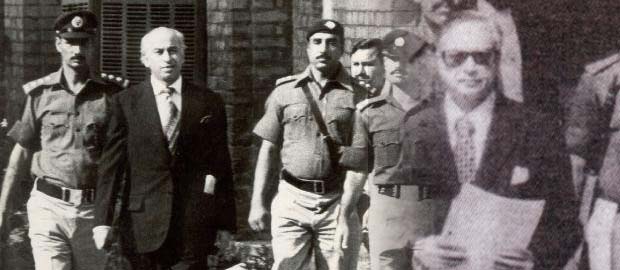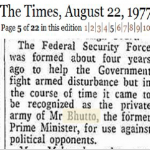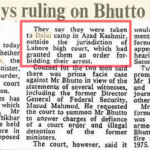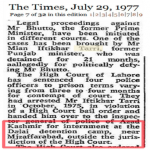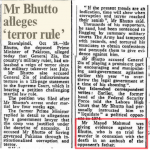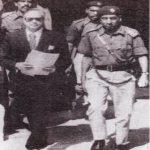This story is of my father Rashid-Ud Din and the Federal Security Force (FSF). The FSF was a Gestapo style security force created by Zulfikar Ali Bhutto back in 1972. Bhutto was the leader of the Pakistan People’s Party (PPP) which he founded in 1967. He served as the 4th President of Pakistan from 1971 to 1973 and then served as the 9th Prime Minister of Pakistan from 1973 to 1977.
The story begins in June 1973, when FSF recruiters started hiring people all over Pakistan. FSF was designed to be a civil task force of the federal Government, supposedly to assist the civil administration and police in keeping law and order without requiring military intervention. However, in reality it was a group of henchmen used by the Bhutto Administration to further their own political interests.
Rashid Ud Din, Former Head Constable FSFFSF recruiters went to every town in Pakistan and said, “We need tall, strong and energetic people. Qualifications do not matter.” Not knowing what the force was all about, my father signed up. Training started the following week. It was very tough and a lot of people dropped out and went into hiding. My father continued and successfully completed the training in Rohri, Sindh. He was then hired as a head constable for the FSF and transferred to the FSF headquarters in Lahore. Shortly afterward, he was posted to Muzaffarabad, Kashmir along with his inspector and thirty soldiers. My father had no idea what awaited him there and nobody was told what was going on. They waited for one month in the camp in Muzaffarabad without knowing what would happen. Suddenly, in the middle of the night, the Pakistani CID (Criminal Investigation Department) who worked with the FSF walked into the rooms of the officers and soldiers and told everyone to put on their uniforms and gather their weapons; they then told everyone to quickly get into their cars. They were driven from Muzaffarbad to Dalai camp, The camp was Located off the road next to the Dalai Mountains, at a very well hidden and secure site. Dalai camp was the worst nightmare of Bhutto’s opponents, this is where the FSF tortured and murdered any one who opposed the Bhutto regime.
The entire force spent the night in the Dalai camp, awaiting their orders. The next morning, they were informed a van of thirty-three high-ranking Pakistani political leaders, ministers and supporters had been captured by the FSF and were on their way to Dalai Camp. The FSF and CID told my father and his fellow soldiers to lock all of these people up in separate rooms and torture them non-stop. My father refused to beat anyone. He went into these “torture rooms” and pretended to beat the people inside. While in the rooms, my father started talking to the prisoners to get their side of the story. My father couldn´t bear what was going on within these camps, so one morning he wrote a letter to his father, explaining what was going on, and sent it off in secret. My father received a reply from his father which read, “My son, I do not want you to use your hands and mouth; it is against our religious beliefs. I do not want you to torture anyone. We were brought to this earth to help one another, not to torture and kill. I trust you will make the right decision. If it all becomes too much, come back to me and we will figure something out.” But leaving wasn’t an option for my father; he had a fixed contract with the FSF and, if he left, he knew it would, mean prison or worse.
Inside the camp, my father secretly started to help the prisoners. He gave them cigarettes, food and often chatted with them. One of the ministers that were taken hostage pleaded my father for his help. “My son, please help us. We have been kidnapped by the Bhutto administration because of our political views. Our families and friends have no idea what has happened to us and where we are. Help leak our story. “After months and months of pleading, my father finally agreed to help.
In his notebook, my father wrote down the names of everyone who had been kidnapped, and what was going on inside these camps. But no one could leave this camp unless it was for a major emergency. My father tried everything to get out. For example, he pretended to be extremely ill and said to one of the camp leaders, “Please let me go to the nearby hospital. I can’t take it anymore. I’m very sick.” But the Camp leader refused several times due to security issues. One night my father managed to escape the camp without anyone finding out and made his way to Lahore. He set up a meeting with the ex-governor of Lahore and his advisors and told them everything happening in these camps and that political members had been imprisoned there – the ex-governor thought all of these members had been killed. At this point, although the FSF had already started searching for my father, they still had no idea what he was up to.
The following day my father made another appointment with a solicitor in Lahore. This solicitor’s brother was being held by the FSF in Dalai camp and my father wanted to let him know. He took out his notebook and told him everything. When my father went to the toilet, he realized he had forgotten his diary at the table. He rushed back and picked up his diary. But it was too late. My father later found out the solicitor had copied down everything in the diary. The next day he went to a court to protest his brother’s arrest and used my father’s notes and name in court without his knowledge. Later, my father said leaving his notebook behind for fifteen minutes was the biggest mistake of his life: the judge was a good friend of Z.A Bhutto and informed him my father was leaking information. No one did anything about the solicitor’s kidnapped brother.
After Z.A Bhutto found out what my father was up to, he ordered a search to apprehend him. He sent the FSF to Lahore, where they thought my father was, but he had already travelled back to his home village to be with his family. At this point my father knew he was going to be captured, and he wanted to spend some time with his family before he was taken away. The FSF sent an army car to every possible location where my father might be hiding: to all of his friends’ and relative’s houses, to the local supermarkets. All this and more in the attempt to track him down. The very same day my grandfather rushed into my father’s room and said, “Rashid, get up. There are FSF and CID vans patrolling this village looking for you.” When my father got up and changed, there was a ring at the door. It was a senior FSF police officer.
“Sir, we need to take your son in for questioning. Worry not, he will be in good care and we will bring him back shortly.” My grandfather couldn’t stop them. My father was put in a FSF van and taken away. My father was the only person in with evidence of the thirty-three people who were being held captive. The story about my father’s arrest got out quickly; my grandfather wrote letters to various ministers in Pakistan and media outlets such as the BBC. Many newspapers also mentioned his arrest at the time.
This is why the FSF couldn´t simply kill my father. My father was given a lot of media attention and if he was executed, the international community would have known straight away how dodgy the FSF and Z.A Bhutto really were – if they didn’t know already.
So the FSF took my father back to Lahore to FSF headquarters, where – under Z.A. Bhutto’s orders – they kept him under house arrest in one of their safe houses. My father was not allowed to speak to anyone from the outside world and anytime he went out for a walk, he was followed by three FSF officers. The house was also guarded by soldiers and officers, all of which made my father’s life very difficult. A couple of months later the FSF moved my father into another FSF safe house in Islamabad. He lived in the upper quarter of the house with a FSF spy who slept in the same room. The security officers and guards also all lived with him. Here, he began to plan his escape. He got up in the middle of the night and took a bus to a friend’s house nearby. My father’s friend, who was a university student at the time, said, “You look terrible. Where have you been and what’s happened to you?” But my father said he didn’t want to talk about it. “I am extremely tired and hungry. Please just be my friend and give me food and talk to me about simple things like the weather and my family.” My father didn’t want to put his friend at risk, so he didn’t tell him anything. Several hours later, my father realised the FSF were probably already looking for him. If they didn’t find him, they would do something to his family. So, that night, he took a bus back to the house. When he arrived, he was beaten and tortured and then moved to yet another safe house.
He was moved near the tribal area where most of his privileges were revoked and he was placed under strict house arrest. He lived with the thought he would be killed any minute; all Z.A Bhutto had to do was say the word and my father would be shot. But Zulfikar Ali Bhutto had bigger problems: his government was becoming increasingly weak which meant he couldn’t afford to take any big risks. Under his oppressive house arrest, my father couldn’t take it anymore. He contemplated suicide, but then decided to attempt another escape. He went to the toilet very early in the morning and turned on the tap – the noise of the water was very loud. This toilet had a back door which was locked, but he smashed it open and ran for it. He got on a bus which took him fifteen miles away from the safe house. But then the bus got stopped and searched by a FSF van looking for my father. When they found him, they pulled him out of the bus and shoved him in the van. They drove him to a private location in a nearby forest and beat him within an inch of his life. The FSF officers told him, “If you try to escape again, be certain we will get authorization from Z.A Bhutto to shoot you and each one of your family members and frame it on someone else.” Once they returned my father to his safe house, they made life even more difficult for him. He wasn’t allowed to go out or do anything. The lights in his room were on 24/7 and he had armed guards watching over him everywhere, also on the toilet. Since my father was desperate for sleep – he couldn’t fall sleep under the bright lights – he took his shoes and smashed the lights in the room. He was beaten every single day for doing this, but he didn’t care anymore. My father had lost all hope. He would rather be killed than live like this. He was visited weekly by a government doctor, who prescribed my father sleeping pills because he was suffering from severe sleep deprivation.
A couple of weeks later my father was moved to his final safe house near Warsak Dam, Thirty Miles northwest of Peshawar. He told me, “This was one of the most difficult times of my life. The guards hated me and wanted me dead. The only thing that was keeping me alive was the FSF spy who slept in the same room as me. He worked with Masood Mahmood – the director of the FSF – and was under strict orders to look after me. But, during the day, the FSF spy had to go to work and I was left alone with the guards. They beat me non-stop.”
Then came the day in May 1977, the day my father was let go. A couple of days before my father had written a harrowing letter to the head of the FSF, Masood Mahmood, stating that he would commit suicide or kill someone in his safe house if they didn’t let him go. He also secretly sent a copy of this letter to his father through one of the FSF guards he had bribed. His father became extremely worried and contacted various Pakistani ministers and news publications, telling them if his son is hurt or dies, it is on the head of the Pakistani government and Z.A Bhutto. Two weeks before this Bhutto had been deposed as prime minister. The government was extremely weak and on their knees. The FSF knew military forces were going to take over soon and they didn’t want to take any risks.
After the head of the FSF read the letter, Masood Mahmood drove down to where my father was being kept under house arrest. He said to my father, “I will let you go. I do not agree with what Z.A Bhutto has done to you and I am not on his side” These were the words of Masood Mahmood, who later helped General Zia-ul-Haq prosecute Z.A Bhutto. My father was then driven to the FSF headquarters where they told him, “If you leak one ounce of information about us or about what we did to you, we will personally come during the night and kill you and your family, so watch yourself.” They also burned all of my father’s FSF paperwork; there was now no longer anything on file to show he had ever worked for the FSF. After this, they put him in a car with two officers and sent my father back to his hometown. On the way, they threatened him again. “Armed guards will come and take you or your family members anytime, day or night.”
After nearly seventeen months, my father was finally reunited with his family. Words cannot describe his happiness and thankfulness to God for being alive. But, still, my father only stayed home for two days. He was terrified of being taken away during the night by the FSF and felt like he was being followed every time he went out. So he decided to go to Multan, Pakistan to stay with his sister and get off the FSF’s radar for a while. He stayed with his sister for two weeks but he still couldn’t shake his fear. He couldn’t eat, couldn’t, sleep properly or talk to anyone. He was frightened of his own country and people. He decided he couldn’t take it anymore; with the help of his family, he booked a one-way ticket to Europe. He wanted to start a new life, a life without fear or danger, one safe for his future family.
Masood Mahmood coming out of Court after giving evidence against Z.A BhuttoShortly after this happened, General Zia Ul Haq took over took the government and martial law was imposed in Pakistan. He took several head FSF members to court and prosecuted them for the murder of various politicians. Although Masood Mahmood was a good friend of Z.A Bhutto, he decided to help General Zia Ul Haq. He also had a secret deal with army generals to testify against Z.A Bhutto, a deal also pushed by the Americans who also wanted to get rid of Bhutto, who they considered a great threat. Z.A Bhutto was sentenced to death and the FSF dissolved. After Bhutto’s execution Masood Mahmood was granted an immigrant visa to the US and given a handsome cash settlement. (See article on the right about Masood Mahmood giving evidence.
My father couldn´t spend another day in Pakistan. But when he arrived at the airport, he met one of the prisoners from Dalai camp. The man said, “Rashid, please don´t go. We need you for the court case against the FSF. Without you we would all be dead. You saved us. Please stay here and I will give you a well-paid job.” But my father couldn’t stay. He went to Europe to start a new life for himself.
And so my father parted ways with his country, the country that had betrayed him. He moved first to Switzerland and then to Germany, where they started the legal proceedings for his asylum case. He spent most of his life in Frankfurt, Germany and now lives in London with his wife.

